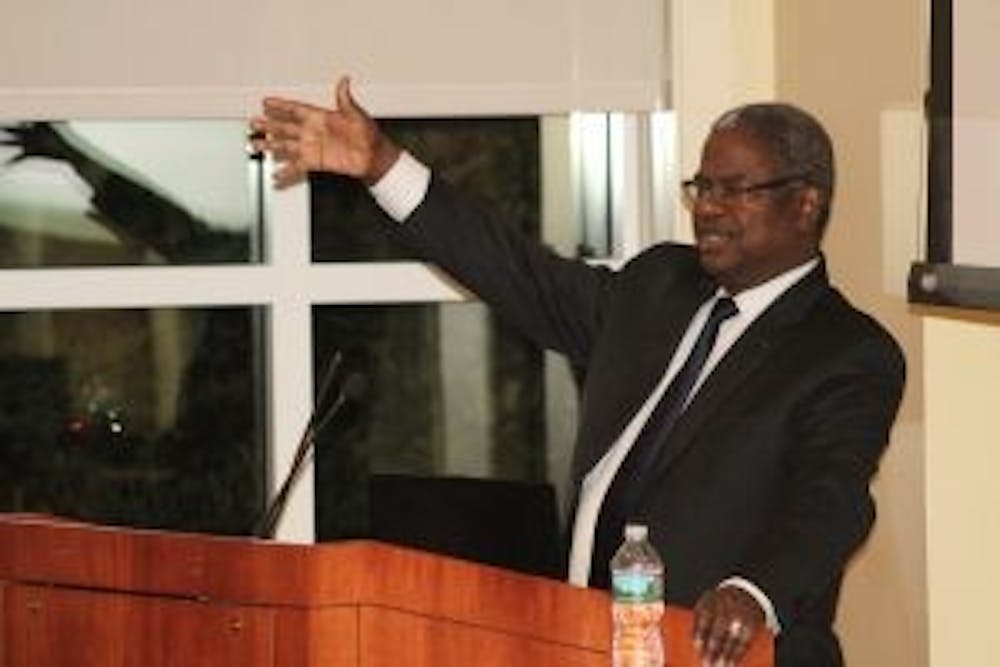His Excellency Tiéna Coulibaly, the Malian ambassador to the United States, spoke about Malian history since its independence from France in 1960 at Mason Hall, Wednesday night.
Coulibaly’s address covered Mali’s history over the past few decades. The country has been disrupted by civil war and conflict since 2012 when the National Movement for the Liberation of Azawad (MNLA) and the jihadist factions, including Ansar Dine and al-Qaeda in the Islamic Maghreb, began fighting against the government for control of northern Mali.
“The rebels occupied two thirds of the country. The rebellion was helped by Jihadists. The rebels are Malians who think that the north has been discriminated against,” Coulibaly said. “Eventually they want a separate country totally. The Jihadists are people who want an Islamic Republic. The point was that, for those who wanted a separate country and those who wanted an Islamic Republic, the common enemy was the Malian army.”
Despite Mali’s many initiatives to drive its government toward a democracy, the coup d’état in 2012 was a major setback.
The African Students Association (ASA) organized the event, and ASA Research, History and Education Chair sophomore Sami Ayele spearheaded the planning of the event. Ayele was approached by a fellow student and friend sophomore Soumaila Haidara, who is Malian, about bringing Coulibaly to speak to Hopkins students.
One of the biggest motivations Haidara had for bringing Coulibaly to Hopkins was to raise awareness about Malian history and its current crisis. He wanted to make sure that Mali’s voice was heard.
“It was important for people to understand that Mali does exist. We had a tough time in our country. We all live in the United States, and we barely know that the U.S. was involved in this conflict that happened in Mali. I felt that him voicing it out was very important.”
Mali has relations with not only the U.S., but also with France. Coulibaly recounts that in December 2012, when the American government initially refused to offer military aid, the French government stepped in to help. They would liberate a city and the Malian army would take over. According to Coulibaly, Malians were grateful for French assistance.
Haidara had similar views on the subject.
“Many Malians feel like we’ve been cheated by France,” he said. “But then again — I speak specifically for Mali — we also feel very thankful to them because if it weren’t for them, we would not have been able to get out of the situation that we were in. We had an al-Qaeda presence in the north, who took the majority of the country and our army couldn’t fight them.”
Haidara spoke about the personal connection that he has to the political turmoil that has occurred in Mali.
“My aunt was in America, and she was actually afraid to go back to Mali. I have family members... who we lost touch with because of everything that’s happened,” Haidara said. “The army that overthrew the president, they didn’t do it for the people. If you read the news, they were very aggressive towards the civilian population. My aunt had AK-47s shot at her car. They told her to get out of her car, the members of the group that led the coup d’état, and they literally stole her car. It was one of those moments she literally feared for her life.”
During the question and answer session, one of the most predominant themes was the subject of U.S. aid and whether or not it hindered Mali’s self-sufficiency. Sophomore Tosin Owoyemi, collaborative chair of ASA, said that Coulibaly’s answer shed new light on the issue.
“Someone asked the question, ‘How do African countries feel when other countries of power give so much aid? Is that something that a country, especially a president, would look down upon?’” she said. “But then, he brought up the scenario of starvation. If your people are starving and someone offers you food, are you not going to take it? Are you going to let your people starve?”
Senior Kemi Oguntona, the president of ASA, asked those questions during the Q&A. She pointed out that sometimes countries give aid as a manipulation tactic.
“The U.S. giving so much aid is like trying to promote democracy. That’s a good thing, but the way some first-world countries try to spread democracy can be very manipulative. I think aid from my perspective has been one of those ways,” she said.
Oguntona elaborated on how Americans may look down on Mali because of the amount of aid that the U.S. provides the country.
“I really wanted to get his perspective on how Malians really view this foreign intervention into their country. Even from our standpoint, when we’re giving so much aid to a country, there’s a level of pity and disrespect toward African countries because they receive that aid,” Oguntona said. “The problem is not as black and white as it seems. I hope he helped some people realize it’s not just theories, people’s lives are actually at stake when we’re talking about these things.”
Junior Kelechi Basil, Vice President of ASA, discussed the atmosphere the talk was intended to facilitate.
“The biggest concern was making sure the event went as smooth as possible and creating as welcoming an atmosphere as we can,” he said. “We wanted to create a sphere in which if we wanted to have these types of events again we would be able to have those relations.”





